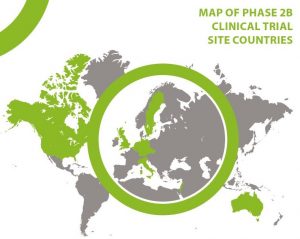
The Phase IIb study is a randomized, double-blind, parallel group, placebo and active-controlled study to evaluate the efficacy, safety, PD, and population PK of vamorolone administered orally at daily doses of 2.0 mg/kg and 6.0 mg/kg versus prednisone 0.75 mg/kg/day and placebo over a Treatment Period of 24 weeks, and to evaluate persistence of effect over a Treatment Period of 48 weeks in ambulant boys ages 4 to <7 years with DMD.
The study will compare the effect and the side effect profile of vamorolone versus placebo and daily prednisolone to determine whether vamorolone improves muscle strength and function compared to placebo and whether it has less side effects compared to prednisolone.
 November 2021: The Phase 2b study is completed.
November 2021: The Phase 2b study is completed.
The study recruited boys with a confirmed diagnosis of Duchenne muscular dystrophy (defined as total absence of dystrophin on muscle biopsy or genetic confirmation of an out-of-frame mutation in the dystrophin gene), who has not previously receive corticosteroids (prednisolone or deflazacort), older than 4 and younger than 7 years of age. Participants had to be able to walk and to get up from the floor without assistance. Any condition which would preclude the prescription of corticosteroids would represent an exclusion criteria from the study. Current or previous (within 3 months) participation in other clinical trials with investigational drugs and the use of idebenone will represent exclusion criteria. Other specific inclusion and exclusion criteria will be in place to ensure to reach the primary endpoints within the study period.
This was a randomized, double blind study. This means that decision on whether a subject will receive vamorolone, placebo or prednisolone will be made randomly (like flipping a coin) by a computer and neither the participants, the families nor the study doctors will know which treatment the subject is receiving during the study. This is to guard against both experimenter bias and placebo effects.
The study recruited 120 boys with DMD in 33 trial sites in the following countries:
 Australia – Melbourne & Westmead
Australia – Melbourne & Westmead
Belgium – Ghent & Leuven
Canada – Montreal, Ottawa, Calgary and Vancouver
Czech Republic – Prague & Brno
Greece – Athens
Israel – Tel Aviv
Netherlands – Leiden & Nijmegen
Spain – Barcelona & Valencia
Sweden – Gothenburg
United Kingdom – Glasgow, Newcastle, Leeds, Liverpool, Birmingham, London
USA – Davis California, Los Angeles, Colorado, Florida, Chicago, Minnesota, North Carolina, Richmond Virginia, and Seattle.
In order to participate in the study, the boys and the families will need to sign a consent form and full information about the details of the study will be provided to allow them to make an informed decision.
Study information
Study drugs (vamorolone, prednisolone and placebo) will be administered orally daily, in the morning after breakfast. Study drugs will be administered in clinic during the study visits and at home in between study visits. Parents will be asked to keep a diary to record when the participant takes the drug, any missed dose or if he felt unwell while participating in the study.
The prednisone group will be used as an active control comparison for safety and efficacy endpoints as requested by the European Medicines Agency (EMA). The placebo group will be used as comparator for efficacy endpoints (superiority model) as requested by the EMA and Food and Drug Administration (FDA) protocol advisory board.
The study is split into two treatment periods.
During period 1 (first 24 weeks) recruited boys will receive either vamorolone, prednisolone or placebo).
During treatment period 2 (week 28 to week 48) all boys will receive vamorolone (either the high dose or low dose).
At the end of the Treatment Period 2, boys will be given the option of enrolling into a long-term extension study or to transition to standard of care treatment for DMD (i.e. discontinuing study drug and receiving treatment according to care recommendations).
Participants will be asked to regularly attend the clinic for study assessments. The frequency of these assessments will be higher at the beginning of the study (during screening period and when study drugs is started). At each study visit, the doctor and the study nurse will ensure that the participants are well and have not experienced side effects from the study drug. To do so, several procedures will be performed, including physical examination, blood and urine tests, questionnaires and vital signs. At some visits, participants will undergo a comprehensive physiotherapy and functional assessment to evaluate the effect of the study drugs on muscle strength: these will include the North Star Ambulatory Assessment, functional testing (time to rise from the floor, time to climb stairs, time to run 10 meters), 6 minute walking test (6MWT), muscle MRI, measures of the respiratory and heart functions.
The study will be conducted in accordance with the highest standards of care currently available for the management of DMD.
The boys and the families will be able to withdraw from the study at any time and this will not affect the level of care they receive.
Click here for more information about this trial
